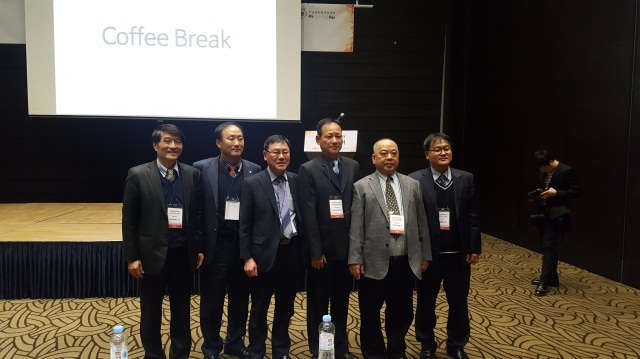■ Asu Su/Michelle Mai
Thomas Liu, the president of Game Time International (GTI) and the chairman in charge of GTI’s two expos, was invited by Jeonnam Information & Culture Industry Promotion Agency (JOIA) to attend its B2B and Video game Industry Forum held in Yeosu, Jeollanam-do, South Korea. During the forum, he made a keynote speech and exchanged ideas with local game companies, and also signed a memorandum of cooperation with JOIA.

The meeting among the representatives of South Korea, Mainland China and Taiwan has promoted their exchanges and deepened the cooperation. Xie Jinde (second right), the president of a Taiwan-based company Xingqi Co., Ltd. .
.jpg)
Oh Chang-Yul, the president of JOIA, made an opening speech at B2B and Video game Industry Forum.
Tripartite cooperation to create a win-win situation
.jpg)
JOIA signed a memorandum of cooperation with TAMA and GTI.
Tsai Chi-ming, the chairman of the Taiwan Amusement Machine Association (TAMA), Thomas Liu, the president of GTI and Xie Jinde, the president of a Taiwan-based company Xingqi Co., Ltd. received an invitation from JOIA for a three-day-two-night business inspection in South Korea. Meanwhile, they participated in the B2B and Video game Industry Forum on February 26th and exchanged ideas and discussions with local game companies. During the forum, Tsai Chi-ming issued the development status of video game industry in Taiwan; Thomas Liu analyzed the development situation and trends in the global game and entertainment industry on some key information such as industrial scale, policy situation, supply and demand models in the Asian region in 2017, especially the Chinese market. Besides, he also pointed out the opportunities and challenges for the development of the global game and entertainment industry in 2018. And Xie Jinde discussed the successful sales and circulation of overseas video game machines.
.jpg)
The president of GTI Thomas Liu made a keynote speech and sincerely invited South Korean entrepreneurs to GTI’s two expos.
As the chairman in charge of GTI’s two expos, Thomas Liu also sent a sincere invitation to South Korean entrepreneurs to meet with the superior game and entertainment companies from Taiwan and Mainland China at the GTI Asia Taipei Expo on May 10-12 and the GTI Asia China Expo on September 12-14. Close contact and direct communication are the best ways for them to understand the industry development of these two places and find cooperative opportunities for business development that not only can promote economic exchanges between China and South Korea, but also bring more diversified and powerful energy to the transformation and upgrading of the industry. GTI is willing to search a paradise full of opportunities for Sino-Korea enterprises to create a win-win situation. On Feb. 27th, JOIA signed a memorandum of cooperation with TAMA and GTI for the friendly and mutually beneficial deep cooperation of international expansion, technology applications, market information, and talent exchanges in the game entertainment industry.
Overview of the South Korean game market
According to the data from the Bank of South Korea (Central Bank), from 2007 to 2009, the intellectual property revenue of the video game industry in South Korea was only $170m. Later on, it showed a rapid growth trend, reaching $270m and $570m in 2010 and 2011 respectively, even up to about $700m in 2012, which was 5.7 times as high as other Hallyu industries such as entertainment, broadcasting, and movies and accounted for 85% of the entire Hallyu industry. Therefore, the video game industry has become the mainstream among Hallyu industries.
In 2014, with the booming development in China’s game market, China occupied the position of the largest export target country for South Korea’s game industry, accounting for nearly 40% of its export market. From 2014 to 2016, a total of 48 South Korean game companies marched into China. In 2015, the game industry in South Korea fell into a downturn. The South Korean government has spent a huge sum of ₩27.9 billion (263 million) to develop a competitive game industry and save the game industry from sluggishness. As the foreign media have reported, some games like Player Unknown’s Battle Grounds (PUBG) and Lineage2: Revolution have been a big hit in the South Korean game market, which has achieved remarkable expansion in 2017. Depending on the data provided by the South Korea Creative Content Agency, South Korea’s game industry revenue is expected to reach ₩11.5 trillion (approximately $10.6 billion) in 2017, an increase of 6.2% year-on-year.
Even though there were reduced economic exchanges between China and South Korea in 2017, South Korea’s game industry is still achieving fruitful results in overseas and local markets this year as the result of its mature management and operation. From Player Unknown’s Battle Grounds to Lineage2: Revolution, the development of the entertainment game industry in South Korea really has to be admired.
※The article is published in the GTI Magazine Issue No. 162 in Mar. 2018
|